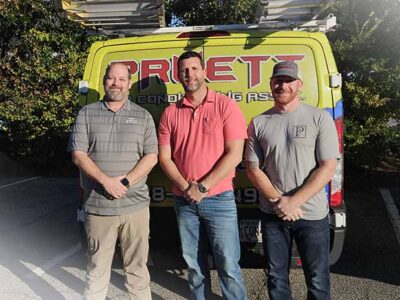
Choosing an HVAC system that’s the right size for your Dublin, Georgia, home will help you lower your utility bills. Read on to learn how sizing your HVAC system improperly can waste energy via constant cycling and poor humidity control.
How HVAC Sizing Works
The Air Conditioning Contractors of America created the Manual J, also called the Residential Load Calculation. Many professional service technicians use special Manual J software that considers:
- Your home’s insulation
- Average local temperatures
- The amount of shade
- The sizes of your windows
- The number of doors that lead outside
- The number of people in your family
You should think about resizing your air conditioner and furnace if you’re:
- Building a new addition to your home
- Installing new appliances
- Adding skylights
- Making other significant changes
If you’re building a new home, you should design your ductwork according to Manual D or Residential Duct Design. It uses many of the same variables as Manual J. Ducts that are too large won’t move air fast enough to make your family comfortable. If they’re too small, they’ll be noisy and may increase your electricity bills.
Make sure that your existing ductwork is the correct size by measuring the airflow from your vents. The placement of your HVAC system’s return and supply registers should be accurate for its type and size, as well. You should have a professional check for leaks that can waste energy and reduce your indoor air quality.
Undersizing
If your heating and air conditioning system is too small, it will run constantly. That’s because it will have trouble getting your home to the temperature you set on your thermostat. This can shorten your HVAC system’s life, waste energy, and cause expensive and inconvenient breakdowns. As a result, you’ll deal with high utility bills and areas in your home that are too cold or hot for comfort.
Oversizing
Many heating and air conditioning units are oversized, increasing installation costs and utility bills. Oversized units also often have a problem called short-cycling. They can bring the air in your home to the ideal temperature quickly, but this causes your system to come on and off often.
If you’re planning to add a few rooms to your home, upgrade your insulation or refinish your basement, choose an HVAC system with a variable speed air handler. These systems have various high and low settings instead of only on and off switches. This means they can handle a wider range of loads, and they use less energy than standard systems.
Poor Humidity Control
Heaters and air conditioners both alter the temperature of your home and reduce its humidity. However, larger units are less likely to control humidity well.
Since larger units run on short cycles, they don’t stay on long enough to remove moisture effectively. This can lead to mold growth and make your home feel warm and wet.
Choosing the correct capacity for your HVAC system is essential for saving energy and reducing maintenance and installation costs. If your heater or air conditioner is too large, try complementing it with a humidifier until you can install a properly sized unit.
Pruett Air Conditioning is a Carrier Factory Authorized Dealer with more than 40 years of HVAC experience. We can help you choose the right size for your home as well as install, maintain, and repair a variety of heating and cooling equipment. Call us anytime at 478-953-4986 or 478-374-1481 for excellent service from our expert service technicians. We look forward to helping you maximize your comfort at home for a minimal cost.
Image provided by Shutterstock

